Report: Impact of Culture and Motivation on Tesco's Behaviour
VerifiedAdded on 2021/02/19
|11
|2927
|17
Report
AI Summary
This report provides an analysis of organisational behaviour within Tesco, a major global retailer. It examines the impact of various factors on individual and team behaviour, including organisational culture, political influences, and power dynamics. The report utilizes Handy's four classes of culture to evaluate Tesco's organisational structure and its effects on employee motivation and performance. Furthermore, it delves into motivation theories, such as Maslow's hierarchy of needs and Vroom's expectancy theory, to understand how Tesco motivates its workforce. The report explores both intrinsic and extrinsic rewards and their impact on employee satisfaction and productivity. It highlights the significance of understanding cultural differences, addressing political environments, and employing effective leadership strategies to enhance overall organisational performance within Tesco. The report concludes with recommendations for Tesco to improve employee motivation and address potential challenges related to organisational behaviour.
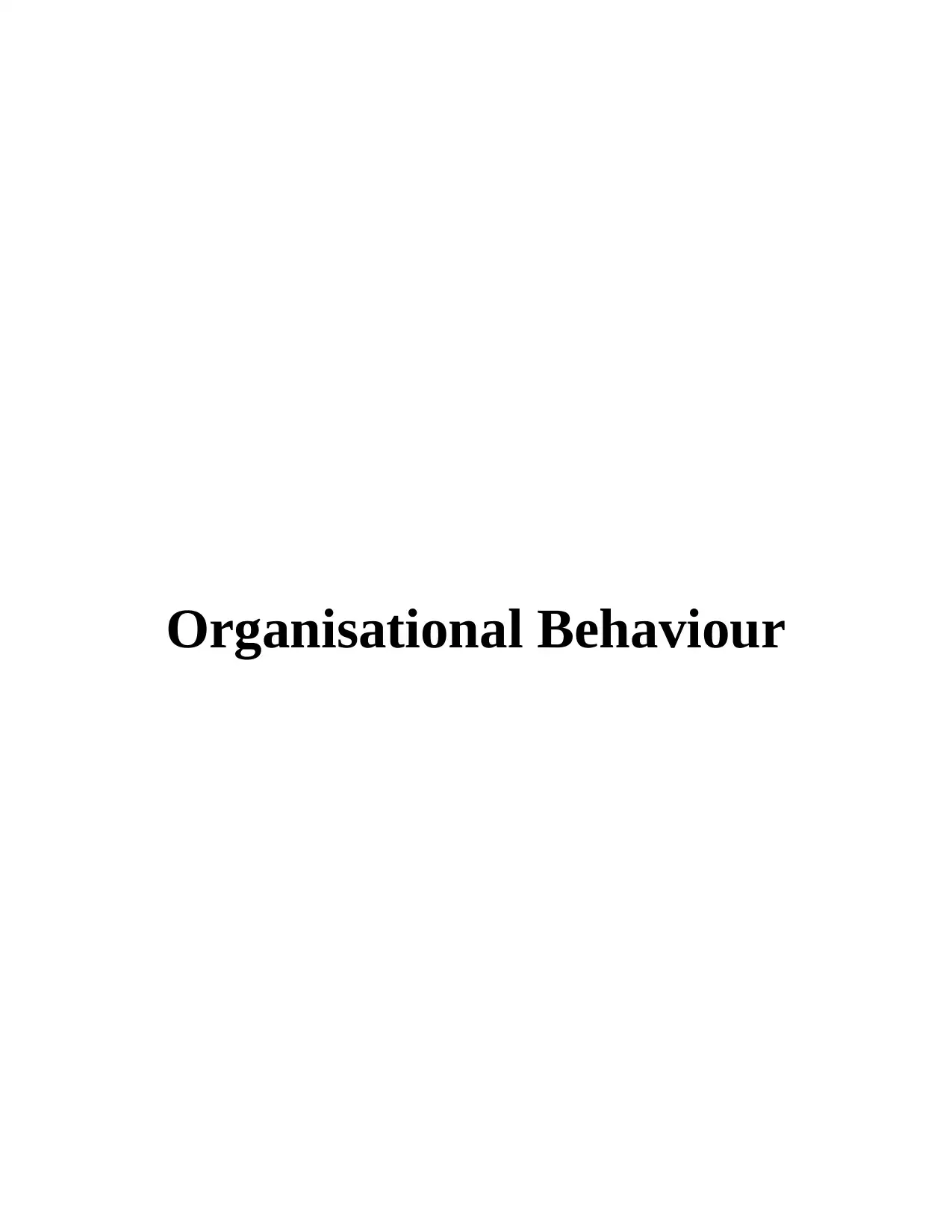
Organisational Behaviour
Paraphrase This Document
Need a fresh take? Get an instant paraphrase of this document with our AI Paraphraser
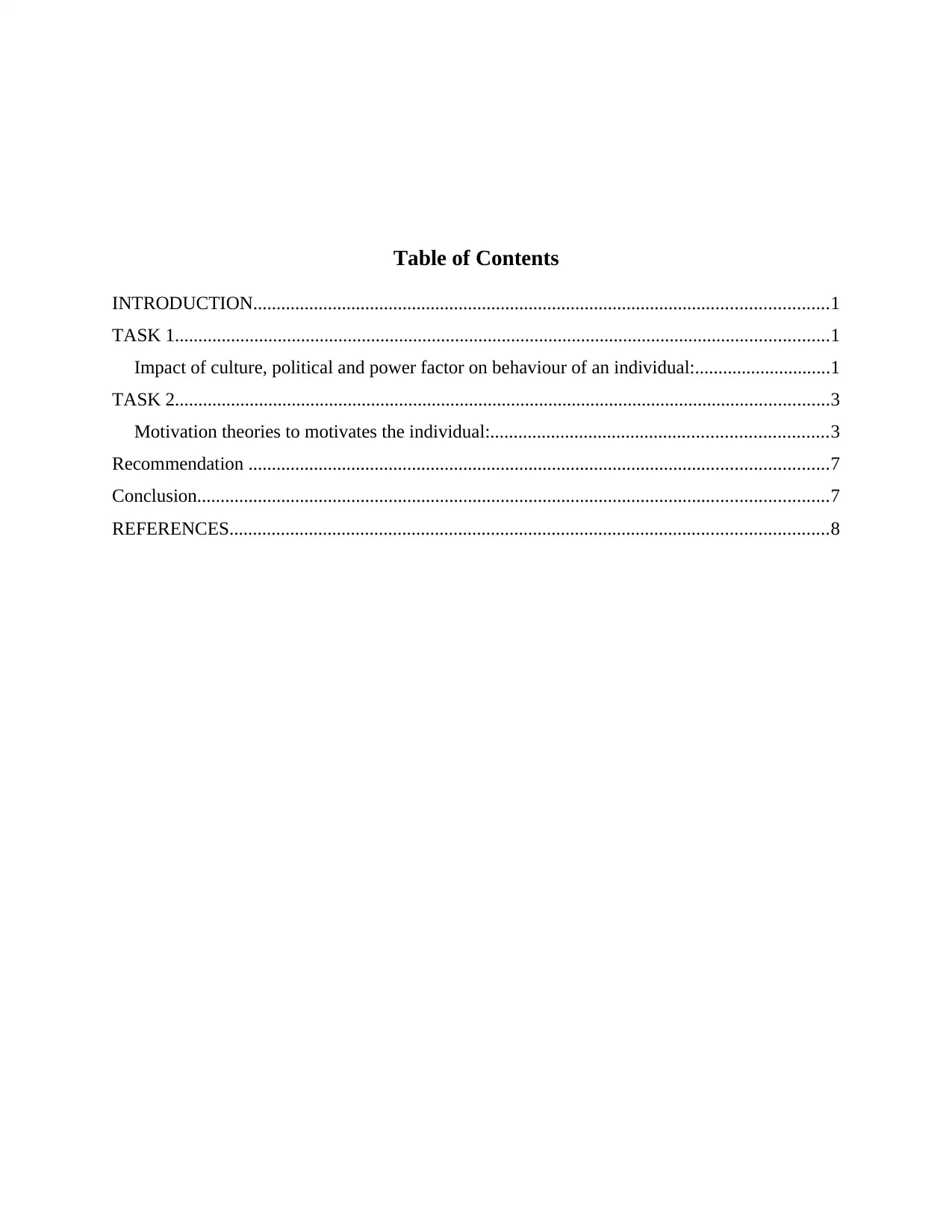
Table of Contents
INTRODUCTION...........................................................................................................................1
TASK 1............................................................................................................................................1
Impact of culture, political and power factor on behaviour of an individual:.............................1
TASK 2............................................................................................................................................3
Motivation theories to motivates the individual:........................................................................3
Recommendation ............................................................................................................................7
Conclusion.......................................................................................................................................7
REFERENCES................................................................................................................................8
INTRODUCTION...........................................................................................................................1
TASK 1............................................................................................................................................1
Impact of culture, political and power factor on behaviour of an individual:.............................1
TASK 2............................................................................................................................................3
Motivation theories to motivates the individual:........................................................................3
Recommendation ............................................................................................................................7
Conclusion.......................................................................................................................................7
REFERENCES................................................................................................................................8
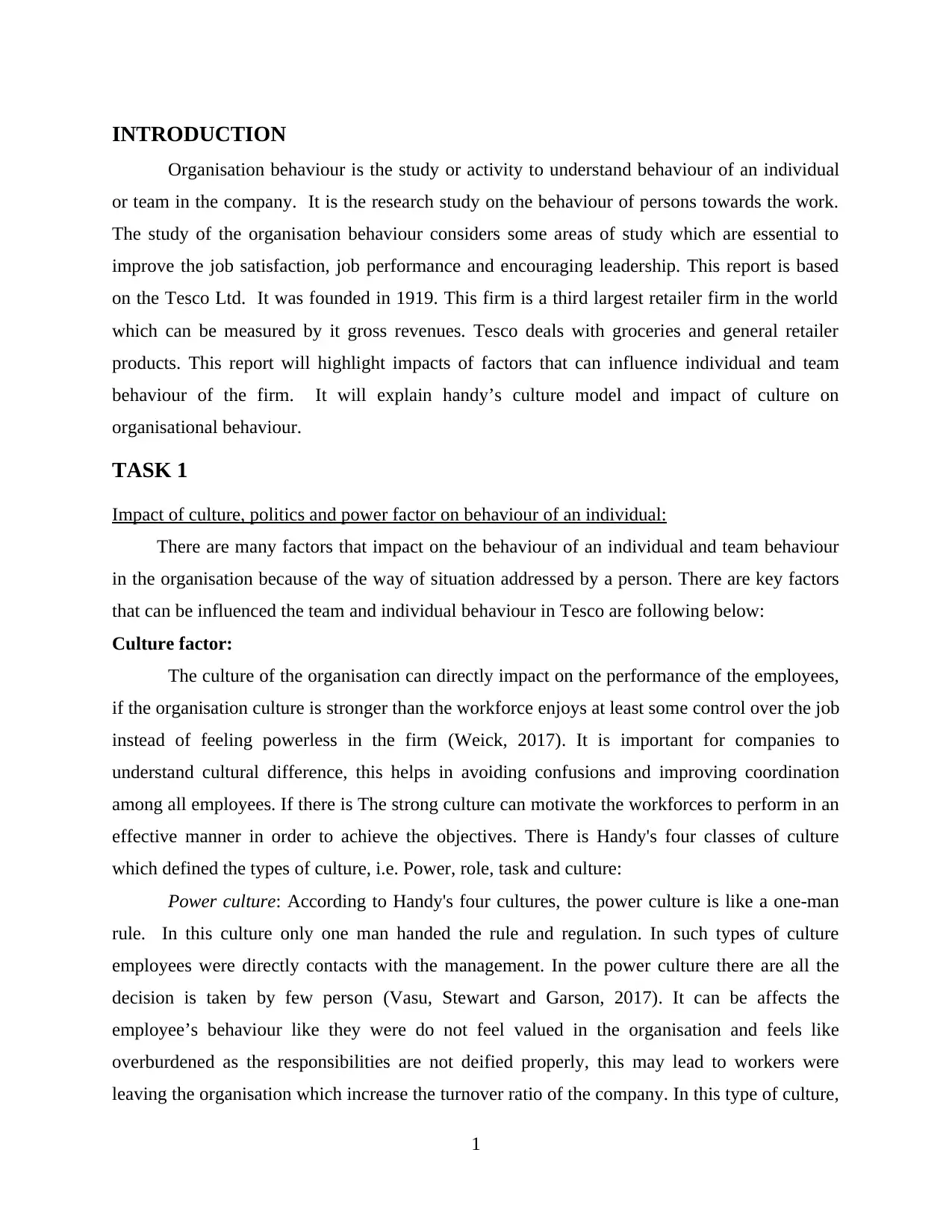
INTRODUCTION
Organisation behaviour is the study or activity to understand behaviour of an individual
or team in the company. It is the research study on the behaviour of persons towards the work.
The study of the organisation behaviour considers some areas of study which are essential to
improve the job satisfaction, job performance and encouraging leadership. This report is based
on the Tesco Ltd. It was founded in 1919. This firm is a third largest retailer firm in the world
which can be measured by it gross revenues. Tesco deals with groceries and general retailer
products. This report will highlight impacts of factors that can influence individual and team
behaviour of the firm. It will explain handy’s culture model and impact of culture on
organisational behaviour.
TASK 1
Impact of culture, politics and power factor on behaviour of an individual:
There are many factors that impact on the behaviour of an individual and team behaviour
in the organisation because of the way of situation addressed by a person. There are key factors
that can be influenced the team and individual behaviour in Tesco are following below:
Culture factor:
The culture of the organisation can directly impact on the performance of the employees,
if the organisation culture is stronger than the workforce enjoys at least some control over the job
instead of feeling powerless in the firm (Weick, 2017). It is important for companies to
understand cultural difference, this helps in avoiding confusions and improving coordination
among all employees. If there is The strong culture can motivate the workforces to perform in an
effective manner in order to achieve the objectives. There is Handy's four classes of culture
which defined the types of culture, i.e. Power, role, task and culture:
Power culture: According to Handy's four cultures, the power culture is like a one-man
rule. In this culture only one man handed the rule and regulation. In such types of culture
employees were directly contacts with the management. In the power culture there are all the
decision is taken by few person (Vasu, Stewart and Garson, 2017). It can be affects the
employee’s behaviour like they were do not feel valued in the organisation and feels like
overburdened as the responsibilities are not deified properly, this may lead to workers were
leaving the organisation which increase the turnover ratio of the company. In this type of culture,
1
Organisation behaviour is the study or activity to understand behaviour of an individual
or team in the company. It is the research study on the behaviour of persons towards the work.
The study of the organisation behaviour considers some areas of study which are essential to
improve the job satisfaction, job performance and encouraging leadership. This report is based
on the Tesco Ltd. It was founded in 1919. This firm is a third largest retailer firm in the world
which can be measured by it gross revenues. Tesco deals with groceries and general retailer
products. This report will highlight impacts of factors that can influence individual and team
behaviour of the firm. It will explain handy’s culture model and impact of culture on
organisational behaviour.
TASK 1
Impact of culture, politics and power factor on behaviour of an individual:
There are many factors that impact on the behaviour of an individual and team behaviour
in the organisation because of the way of situation addressed by a person. There are key factors
that can be influenced the team and individual behaviour in Tesco are following below:
Culture factor:
The culture of the organisation can directly impact on the performance of the employees,
if the organisation culture is stronger than the workforce enjoys at least some control over the job
instead of feeling powerless in the firm (Weick, 2017). It is important for companies to
understand cultural difference, this helps in avoiding confusions and improving coordination
among all employees. If there is The strong culture can motivate the workforces to perform in an
effective manner in order to achieve the objectives. There is Handy's four classes of culture
which defined the types of culture, i.e. Power, role, task and culture:
Power culture: According to Handy's four cultures, the power culture is like a one-man
rule. In this culture only one man handed the rule and regulation. In such types of culture
employees were directly contacts with the management. In the power culture there are all the
decision is taken by few person (Vasu, Stewart and Garson, 2017). It can be affects the
employee’s behaviour like they were do not feel valued in the organisation and feels like
overburdened as the responsibilities are not deified properly, this may lead to workers were
leaving the organisation which increase the turnover ratio of the company. In this type of culture,
1
⊘ This is a preview!⊘
Do you want full access?
Subscribe today to unlock all pages.

Trusted by 1+ million students worldwide
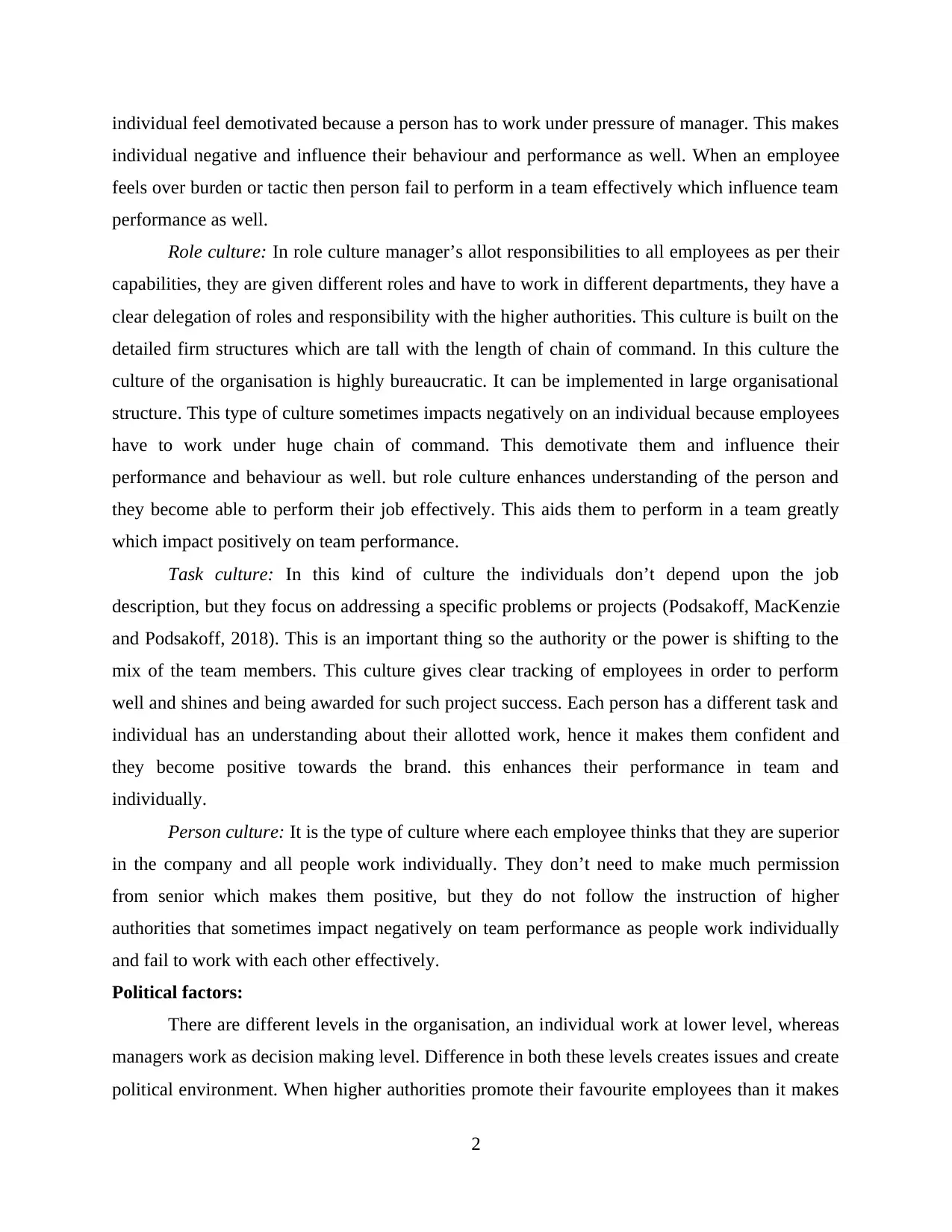
individual feel demotivated because a person has to work under pressure of manager. This makes
individual negative and influence their behaviour and performance as well. When an employee
feels over burden or tactic then person fail to perform in a team effectively which influence team
performance as well.
Role culture: In role culture manager’s allot responsibilities to all employees as per their
capabilities, they are given different roles and have to work in different departments, they have a
clear delegation of roles and responsibility with the higher authorities. This culture is built on the
detailed firm structures which are tall with the length of chain of command. In this culture the
culture of the organisation is highly bureaucratic. It can be implemented in large organisational
structure. This type of culture sometimes impacts negatively on an individual because employees
have to work under huge chain of command. This demotivate them and influence their
performance and behaviour as well. but role culture enhances understanding of the person and
they become able to perform their job effectively. This aids them to perform in a team greatly
which impact positively on team performance.
Task culture: In this kind of culture the individuals don’t depend upon the job
description, but they focus on addressing a specific problems or projects (Podsakoff, MacKenzie
and Podsakoff, 2018). This is an important thing so the authority or the power is shifting to the
mix of the team members. This culture gives clear tracking of employees in order to perform
well and shines and being awarded for such project success. Each person has a different task and
individual has an understanding about their allotted work, hence it makes them confident and
they become positive towards the brand. this enhances their performance in team and
individually.
Person culture: It is the type of culture where each employee thinks that they are superior
in the company and all people work individually. They don’t need to make much permission
from senior which makes them positive, but they do not follow the instruction of higher
authorities that sometimes impact negatively on team performance as people work individually
and fail to work with each other effectively.
Political factors:
There are different levels in the organisation, an individual work at lower level, whereas
managers work as decision making level. Difference in both these levels creates issues and create
political environment. When higher authorities promote their favourite employees than it makes
2
individual negative and influence their behaviour and performance as well. When an employee
feels over burden or tactic then person fail to perform in a team effectively which influence team
performance as well.
Role culture: In role culture manager’s allot responsibilities to all employees as per their
capabilities, they are given different roles and have to work in different departments, they have a
clear delegation of roles and responsibility with the higher authorities. This culture is built on the
detailed firm structures which are tall with the length of chain of command. In this culture the
culture of the organisation is highly bureaucratic. It can be implemented in large organisational
structure. This type of culture sometimes impacts negatively on an individual because employees
have to work under huge chain of command. This demotivate them and influence their
performance and behaviour as well. but role culture enhances understanding of the person and
they become able to perform their job effectively. This aids them to perform in a team greatly
which impact positively on team performance.
Task culture: In this kind of culture the individuals don’t depend upon the job
description, but they focus on addressing a specific problems or projects (Podsakoff, MacKenzie
and Podsakoff, 2018). This is an important thing so the authority or the power is shifting to the
mix of the team members. This culture gives clear tracking of employees in order to perform
well and shines and being awarded for such project success. Each person has a different task and
individual has an understanding about their allotted work, hence it makes them confident and
they become positive towards the brand. this enhances their performance in team and
individually.
Person culture: It is the type of culture where each employee thinks that they are superior
in the company and all people work individually. They don’t need to make much permission
from senior which makes them positive, but they do not follow the instruction of higher
authorities that sometimes impact negatively on team performance as people work individually
and fail to work with each other effectively.
Political factors:
There are different levels in the organisation, an individual work at lower level, whereas
managers work as decision making level. Difference in both these levels creates issues and create
political environment. When higher authorities promote their favourite employees than it makes
2
Paraphrase This Document
Need a fresh take? Get an instant paraphrase of this document with our AI Paraphraser
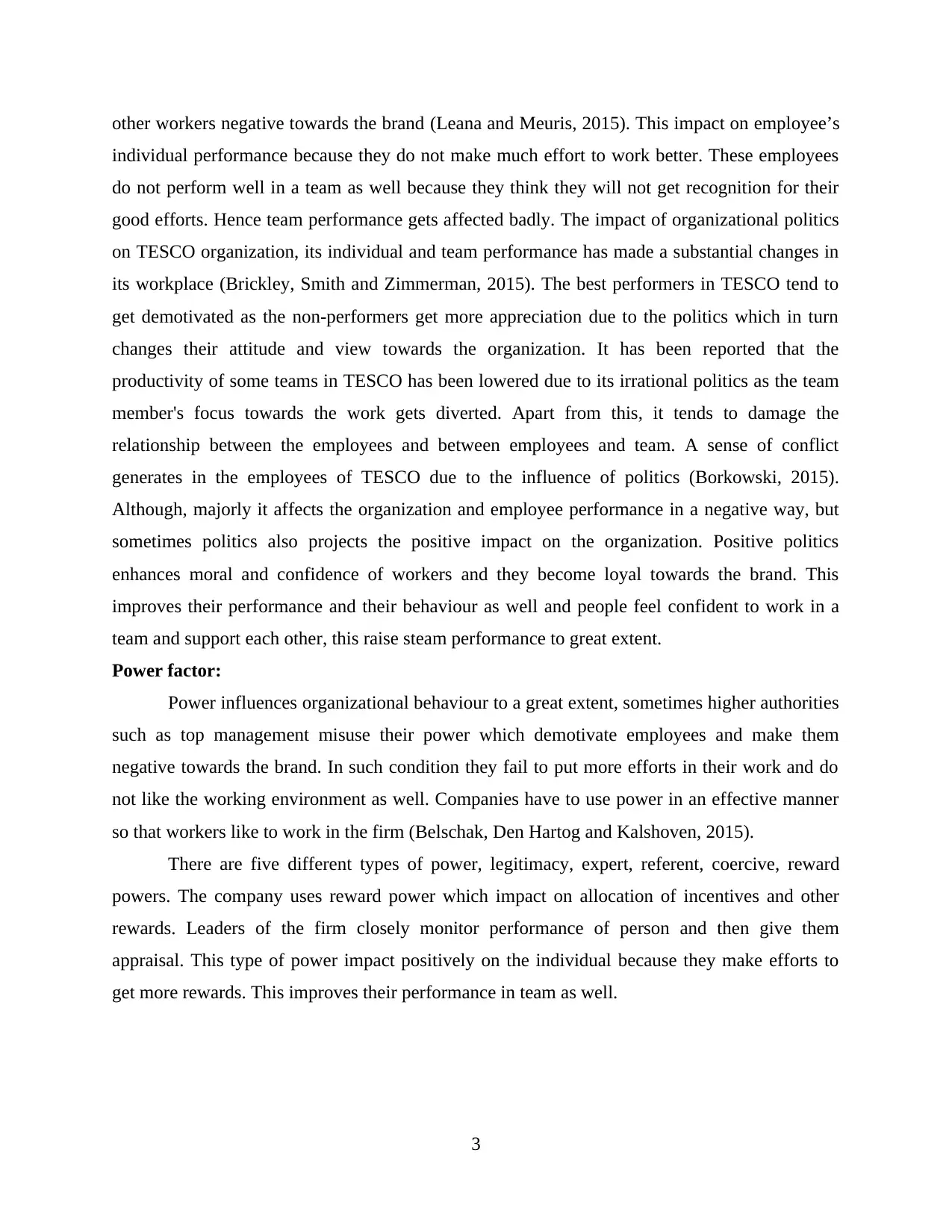
other workers negative towards the brand (Leana and Meuris, 2015). This impact on employee’s
individual performance because they do not make much effort to work better. These employees
do not perform well in a team as well because they think they will not get recognition for their
good efforts. Hence team performance gets affected badly. The impact of organizational politics
on TESCO organization, its individual and team performance has made a substantial changes in
its workplace (Brickley, Smith and Zimmerman, 2015). The best performers in TESCO tend to
get demotivated as the non-performers get more appreciation due to the politics which in turn
changes their attitude and view towards the organization. It has been reported that the
productivity of some teams in TESCO has been lowered due to its irrational politics as the team
member's focus towards the work gets diverted. Apart from this, it tends to damage the
relationship between the employees and between employees and team. A sense of conflict
generates in the employees of TESCO due to the influence of politics (Borkowski, 2015).
Although, majorly it affects the organization and employee performance in a negative way, but
sometimes politics also projects the positive impact on the organization. Positive politics
enhances moral and confidence of workers and they become loyal towards the brand. This
improves their performance and their behaviour as well and people feel confident to work in a
team and support each other, this raise steam performance to great extent.
Power factor:
Power influences organizational behaviour to a great extent, sometimes higher authorities
such as top management misuse their power which demotivate employees and make them
negative towards the brand. In such condition they fail to put more efforts in their work and do
not like the working environment as well. Companies have to use power in an effective manner
so that workers like to work in the firm (Belschak, Den Hartog and Kalshoven, 2015).
There are five different types of power, legitimacy, expert, referent, coercive, reward
powers. The company uses reward power which impact on allocation of incentives and other
rewards. Leaders of the firm closely monitor performance of person and then give them
appraisal. This type of power impact positively on the individual because they make efforts to
get more rewards. This improves their performance in team as well.
3
individual performance because they do not make much effort to work better. These employees
do not perform well in a team as well because they think they will not get recognition for their
good efforts. Hence team performance gets affected badly. The impact of organizational politics
on TESCO organization, its individual and team performance has made a substantial changes in
its workplace (Brickley, Smith and Zimmerman, 2015). The best performers in TESCO tend to
get demotivated as the non-performers get more appreciation due to the politics which in turn
changes their attitude and view towards the organization. It has been reported that the
productivity of some teams in TESCO has been lowered due to its irrational politics as the team
member's focus towards the work gets diverted. Apart from this, it tends to damage the
relationship between the employees and between employees and team. A sense of conflict
generates in the employees of TESCO due to the influence of politics (Borkowski, 2015).
Although, majorly it affects the organization and employee performance in a negative way, but
sometimes politics also projects the positive impact on the organization. Positive politics
enhances moral and confidence of workers and they become loyal towards the brand. This
improves their performance and their behaviour as well and people feel confident to work in a
team and support each other, this raise steam performance to great extent.
Power factor:
Power influences organizational behaviour to a great extent, sometimes higher authorities
such as top management misuse their power which demotivate employees and make them
negative towards the brand. In such condition they fail to put more efforts in their work and do
not like the working environment as well. Companies have to use power in an effective manner
so that workers like to work in the firm (Belschak, Den Hartog and Kalshoven, 2015).
There are five different types of power, legitimacy, expert, referent, coercive, reward
powers. The company uses reward power which impact on allocation of incentives and other
rewards. Leaders of the firm closely monitor performance of person and then give them
appraisal. This type of power impact positively on the individual because they make efforts to
get more rewards. This improves their performance in team as well.
3
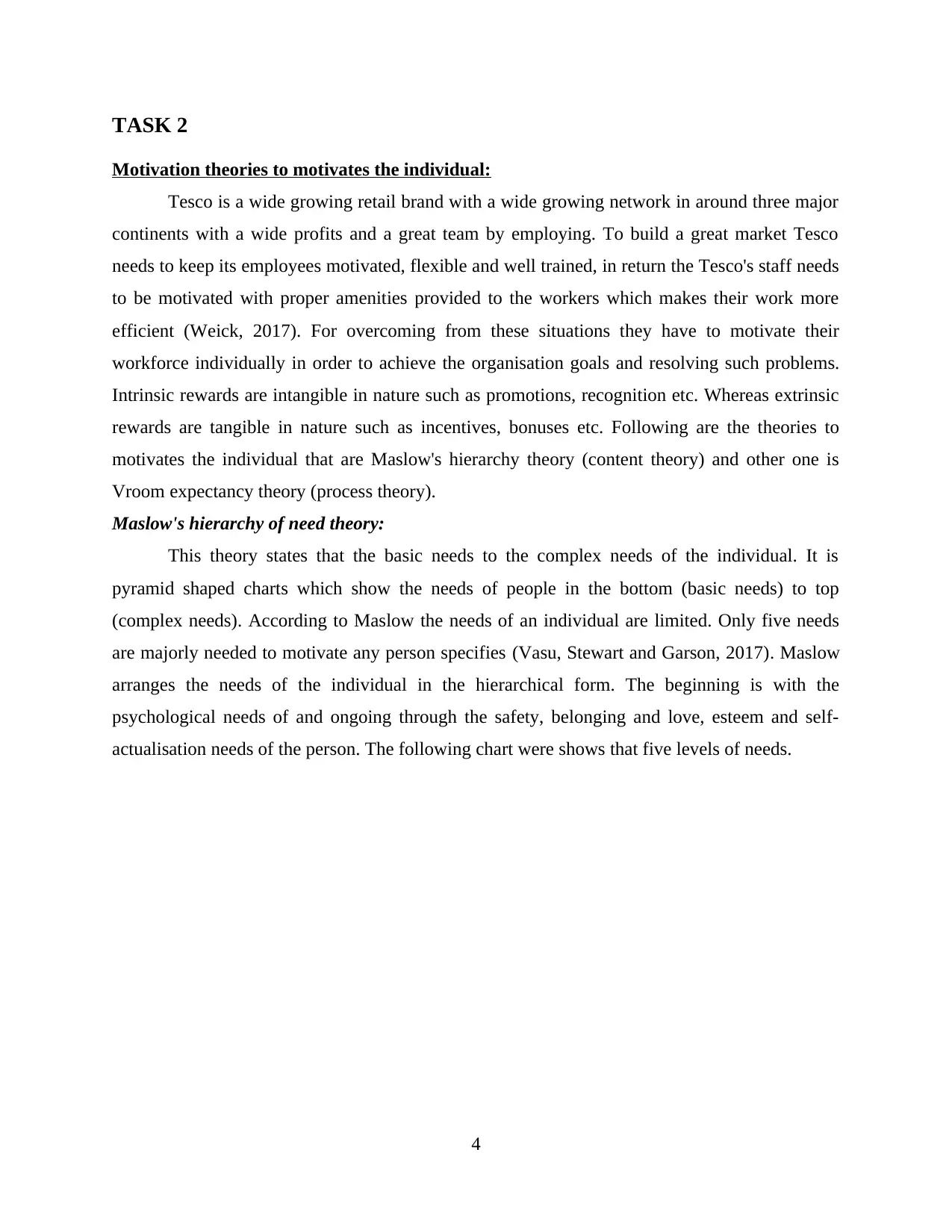
TASK 2
Motivation theories to motivates the individual:
Tesco is a wide growing retail brand with a wide growing network in around three major
continents with a wide profits and a great team by employing. To build a great market Tesco
needs to keep its employees motivated, flexible and well trained, in return the Tesco's staff needs
to be motivated with proper amenities provided to the workers which makes their work more
efficient (Weick, 2017). For overcoming from these situations they have to motivate their
workforce individually in order to achieve the organisation goals and resolving such problems.
Intrinsic rewards are intangible in nature such as promotions, recognition etc. Whereas extrinsic
rewards are tangible in nature such as incentives, bonuses etc. Following are the theories to
motivates the individual that are Maslow's hierarchy theory (content theory) and other one is
Vroom expectancy theory (process theory).
Maslow's hierarchy of need theory:
This theory states that the basic needs to the complex needs of the individual. It is
pyramid shaped charts which show the needs of people in the bottom (basic needs) to top
(complex needs). According to Maslow the needs of an individual are limited. Only five needs
are majorly needed to motivate any person specifies (Vasu, Stewart and Garson, 2017). Maslow
arranges the needs of the individual in the hierarchical form. The beginning is with the
psychological needs of and ongoing through the safety, belonging and love, esteem and self-
actualisation needs of the person. The following chart were shows that five levels of needs.
4
Motivation theories to motivates the individual:
Tesco is a wide growing retail brand with a wide growing network in around three major
continents with a wide profits and a great team by employing. To build a great market Tesco
needs to keep its employees motivated, flexible and well trained, in return the Tesco's staff needs
to be motivated with proper amenities provided to the workers which makes their work more
efficient (Weick, 2017). For overcoming from these situations they have to motivate their
workforce individually in order to achieve the organisation goals and resolving such problems.
Intrinsic rewards are intangible in nature such as promotions, recognition etc. Whereas extrinsic
rewards are tangible in nature such as incentives, bonuses etc. Following are the theories to
motivates the individual that are Maslow's hierarchy theory (content theory) and other one is
Vroom expectancy theory (process theory).
Maslow's hierarchy of need theory:
This theory states that the basic needs to the complex needs of the individual. It is
pyramid shaped charts which show the needs of people in the bottom (basic needs) to top
(complex needs). According to Maslow the needs of an individual are limited. Only five needs
are majorly needed to motivate any person specifies (Vasu, Stewart and Garson, 2017). Maslow
arranges the needs of the individual in the hierarchical form. The beginning is with the
psychological needs of and ongoing through the safety, belonging and love, esteem and self-
actualisation needs of the person. The following chart were shows that five levels of needs.
4
⊘ This is a preview!⊘
Do you want full access?
Subscribe today to unlock all pages.

Trusted by 1+ million students worldwide
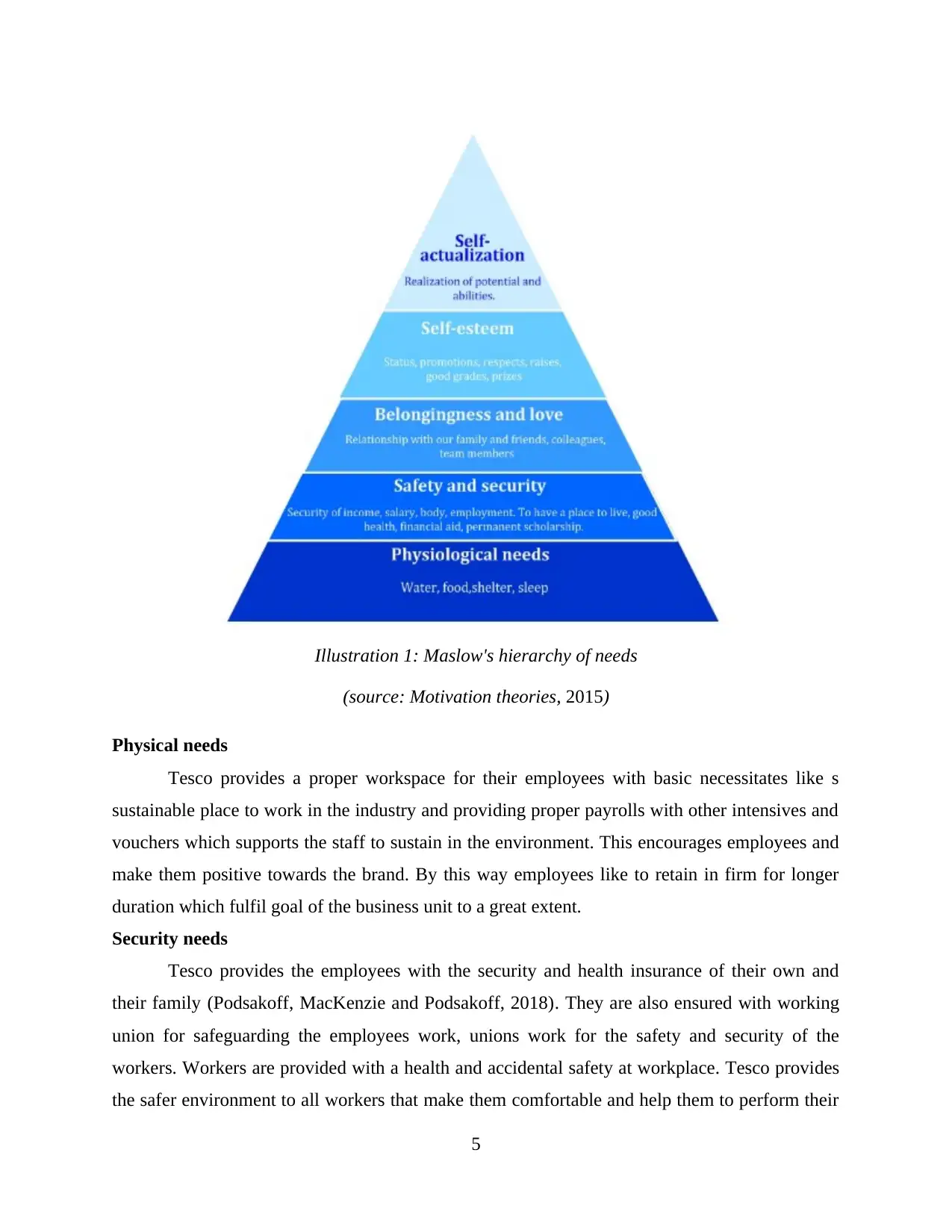
Illustration 1: Maslow's hierarchy of needs
(source: Motivation theories, 2015)
Physical needs
Tesco provides a proper workspace for their employees with basic necessitates like s
sustainable place to work in the industry and providing proper payrolls with other intensives and
vouchers which supports the staff to sustain in the environment. This encourages employees and
make them positive towards the brand. By this way employees like to retain in firm for longer
duration which fulfil goal of the business unit to a great extent.
Security needs
Tesco provides the employees with the security and health insurance of their own and
their family (Podsakoff, MacKenzie and Podsakoff, 2018). They are also ensured with working
union for safeguarding the employees work, unions work for the safety and security of the
workers. Workers are provided with a health and accidental safety at workplace. Tesco provides
the safer environment to all workers that make them comfortable and help them to perform their
5
(source: Motivation theories, 2015)
Physical needs
Tesco provides a proper workspace for their employees with basic necessitates like s
sustainable place to work in the industry and providing proper payrolls with other intensives and
vouchers which supports the staff to sustain in the environment. This encourages employees and
make them positive towards the brand. By this way employees like to retain in firm for longer
duration which fulfil goal of the business unit to a great extent.
Security needs
Tesco provides the employees with the security and health insurance of their own and
their family (Podsakoff, MacKenzie and Podsakoff, 2018). They are also ensured with working
union for safeguarding the employees work, unions work for the safety and security of the
workers. Workers are provided with a health and accidental safety at workplace. Tesco provides
the safer environment to all workers that make them comfortable and help them to perform their
5
Paraphrase This Document
Need a fresh take? Get an instant paraphrase of this document with our AI Paraphraser
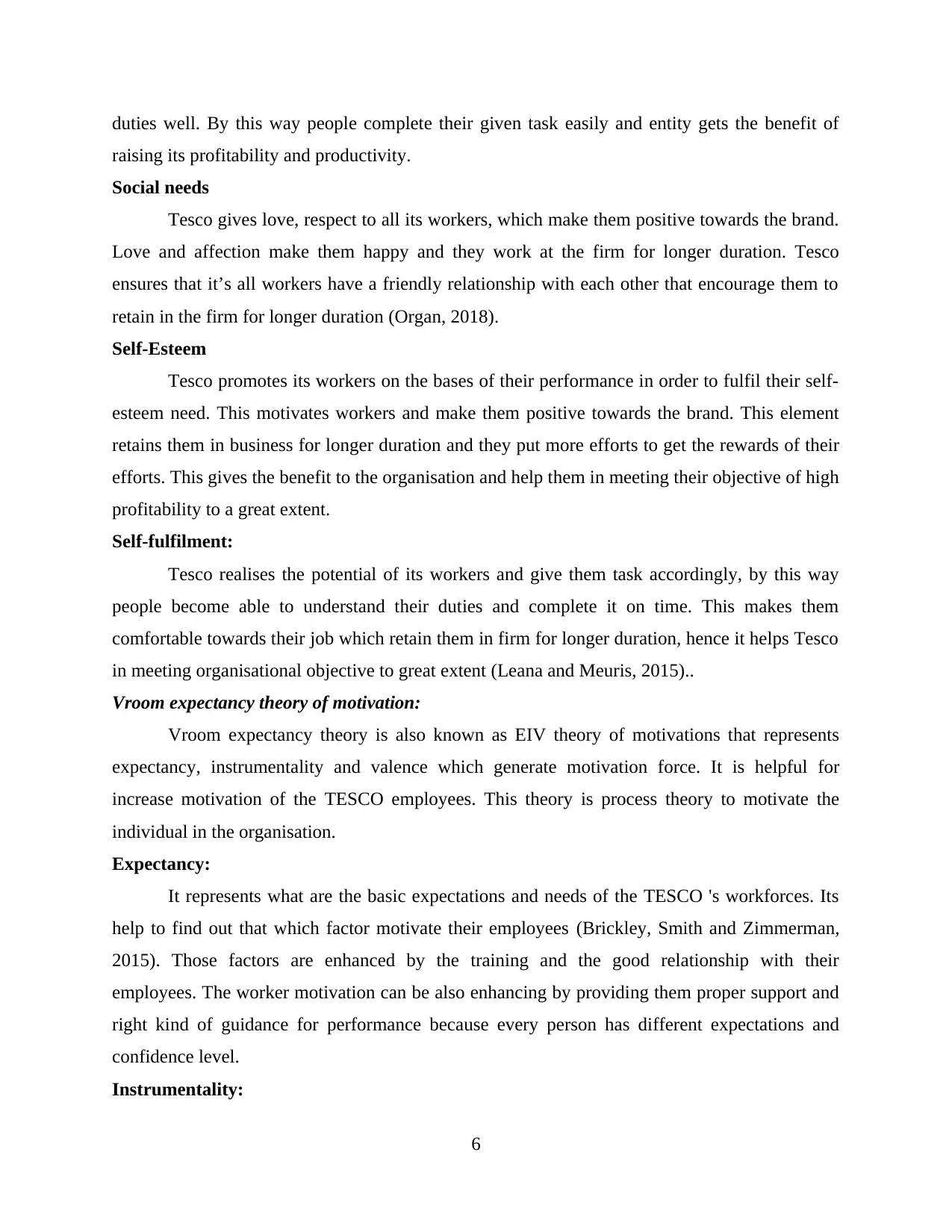
duties well. By this way people complete their given task easily and entity gets the benefit of
raising its profitability and productivity.
Social needs
Tesco gives love, respect to all its workers, which make them positive towards the brand.
Love and affection make them happy and they work at the firm for longer duration. Tesco
ensures that it’s all workers have a friendly relationship with each other that encourage them to
retain in the firm for longer duration (Organ, 2018).
Self-Esteem
Tesco promotes its workers on the bases of their performance in order to fulfil their self-
esteem need. This motivates workers and make them positive towards the brand. This element
retains them in business for longer duration and they put more efforts to get the rewards of their
efforts. This gives the benefit to the organisation and help them in meeting their objective of high
profitability to a great extent.
Self-fulfilment:
Tesco realises the potential of its workers and give them task accordingly, by this way
people become able to understand their duties and complete it on time. This makes them
comfortable towards their job which retain them in firm for longer duration, hence it helps Tesco
in meeting organisational objective to great extent (Leana and Meuris, 2015)..
Vroom expectancy theory of motivation:
Vroom expectancy theory is also known as EIV theory of motivations that represents
expectancy, instrumentality and valence which generate motivation force. It is helpful for
increase motivation of the TESCO employees. This theory is process theory to motivate the
individual in the organisation.
Expectancy:
It represents what are the basic expectations and needs of the TESCO 's workforces. Its
help to find out that which factor motivate their employees (Brickley, Smith and Zimmerman,
2015). Those factors are enhanced by the training and the good relationship with their
employees. The worker motivation can be also enhancing by providing them proper support and
right kind of guidance for performance because every person has different expectations and
confidence level.
Instrumentality:
6
raising its profitability and productivity.
Social needs
Tesco gives love, respect to all its workers, which make them positive towards the brand.
Love and affection make them happy and they work at the firm for longer duration. Tesco
ensures that it’s all workers have a friendly relationship with each other that encourage them to
retain in the firm for longer duration (Organ, 2018).
Self-Esteem
Tesco promotes its workers on the bases of their performance in order to fulfil their self-
esteem need. This motivates workers and make them positive towards the brand. This element
retains them in business for longer duration and they put more efforts to get the rewards of their
efforts. This gives the benefit to the organisation and help them in meeting their objective of high
profitability to a great extent.
Self-fulfilment:
Tesco realises the potential of its workers and give them task accordingly, by this way
people become able to understand their duties and complete it on time. This makes them
comfortable towards their job which retain them in firm for longer duration, hence it helps Tesco
in meeting organisational objective to great extent (Leana and Meuris, 2015)..
Vroom expectancy theory of motivation:
Vroom expectancy theory is also known as EIV theory of motivations that represents
expectancy, instrumentality and valence which generate motivation force. It is helpful for
increase motivation of the TESCO employees. This theory is process theory to motivate the
individual in the organisation.
Expectancy:
It represents what are the basic expectations and needs of the TESCO 's workforces. Its
help to find out that which factor motivate their employees (Brickley, Smith and Zimmerman,
2015). Those factors are enhanced by the training and the good relationship with their
employees. The worker motivation can be also enhancing by providing them proper support and
right kind of guidance for performance because every person has different expectations and
confidence level.
Instrumentality:
6
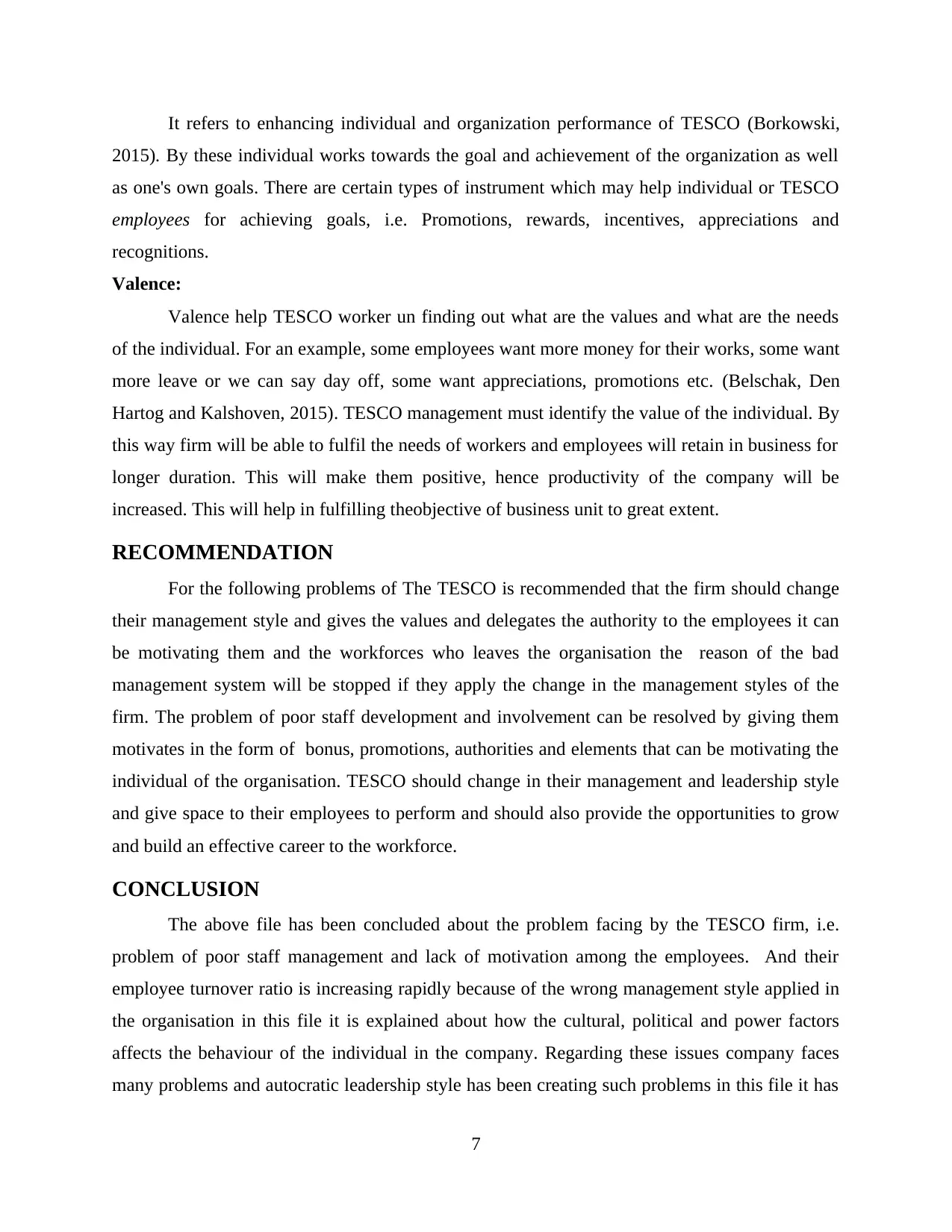
It refers to enhancing individual and organization performance of TESCO (Borkowski,
2015). By these individual works towards the goal and achievement of the organization as well
as one's own goals. There are certain types of instrument which may help individual or TESCO
employees for achieving goals, i.e. Promotions, rewards, incentives, appreciations and
recognitions.
Valence:
Valence help TESCO worker un finding out what are the values and what are the needs
of the individual. For an example, some employees want more money for their works, some want
more leave or we can say day off, some want appreciations, promotions etc. (Belschak, Den
Hartog and Kalshoven, 2015). TESCO management must identify the value of the individual. By
this way firm will be able to fulfil the needs of workers and employees will retain in business for
longer duration. This will make them positive, hence productivity of the company will be
increased. This will help in fulfilling theobjective of business unit to great extent.
RECOMMENDATION
For the following problems of The TESCO is recommended that the firm should change
their management style and gives the values and delegates the authority to the employees it can
be motivating them and the workforces who leaves the organisation the reason of the bad
management system will be stopped if they apply the change in the management styles of the
firm. The problem of poor staff development and involvement can be resolved by giving them
motivates in the form of bonus, promotions, authorities and elements that can be motivating the
individual of the organisation. TESCO should change in their management and leadership style
and give space to their employees to perform and should also provide the opportunities to grow
and build an effective career to the workforce.
CONCLUSION
The above file has been concluded about the problem facing by the TESCO firm, i.e.
problem of poor staff management and lack of motivation among the employees. And their
employee turnover ratio is increasing rapidly because of the wrong management style applied in
the organisation in this file it is explained about how the cultural, political and power factors
affects the behaviour of the individual in the company. Regarding these issues company faces
many problems and autocratic leadership style has been creating such problems in this file it has
7
2015). By these individual works towards the goal and achievement of the organization as well
as one's own goals. There are certain types of instrument which may help individual or TESCO
employees for achieving goals, i.e. Promotions, rewards, incentives, appreciations and
recognitions.
Valence:
Valence help TESCO worker un finding out what are the values and what are the needs
of the individual. For an example, some employees want more money for their works, some want
more leave or we can say day off, some want appreciations, promotions etc. (Belschak, Den
Hartog and Kalshoven, 2015). TESCO management must identify the value of the individual. By
this way firm will be able to fulfil the needs of workers and employees will retain in business for
longer duration. This will make them positive, hence productivity of the company will be
increased. This will help in fulfilling theobjective of business unit to great extent.
RECOMMENDATION
For the following problems of The TESCO is recommended that the firm should change
their management style and gives the values and delegates the authority to the employees it can
be motivating them and the workforces who leaves the organisation the reason of the bad
management system will be stopped if they apply the change in the management styles of the
firm. The problem of poor staff development and involvement can be resolved by giving them
motivates in the form of bonus, promotions, authorities and elements that can be motivating the
individual of the organisation. TESCO should change in their management and leadership style
and give space to their employees to perform and should also provide the opportunities to grow
and build an effective career to the workforce.
CONCLUSION
The above file has been concluded about the problem facing by the TESCO firm, i.e.
problem of poor staff management and lack of motivation among the employees. And their
employee turnover ratio is increasing rapidly because of the wrong management style applied in
the organisation in this file it is explained about how the cultural, political and power factors
affects the behaviour of the individual in the company. Regarding these issues company faces
many problems and autocratic leadership style has been creating such problems in this file it has
7
⊘ This is a preview!⊘
Do you want full access?
Subscribe today to unlock all pages.

Trusted by 1+ million students worldwide
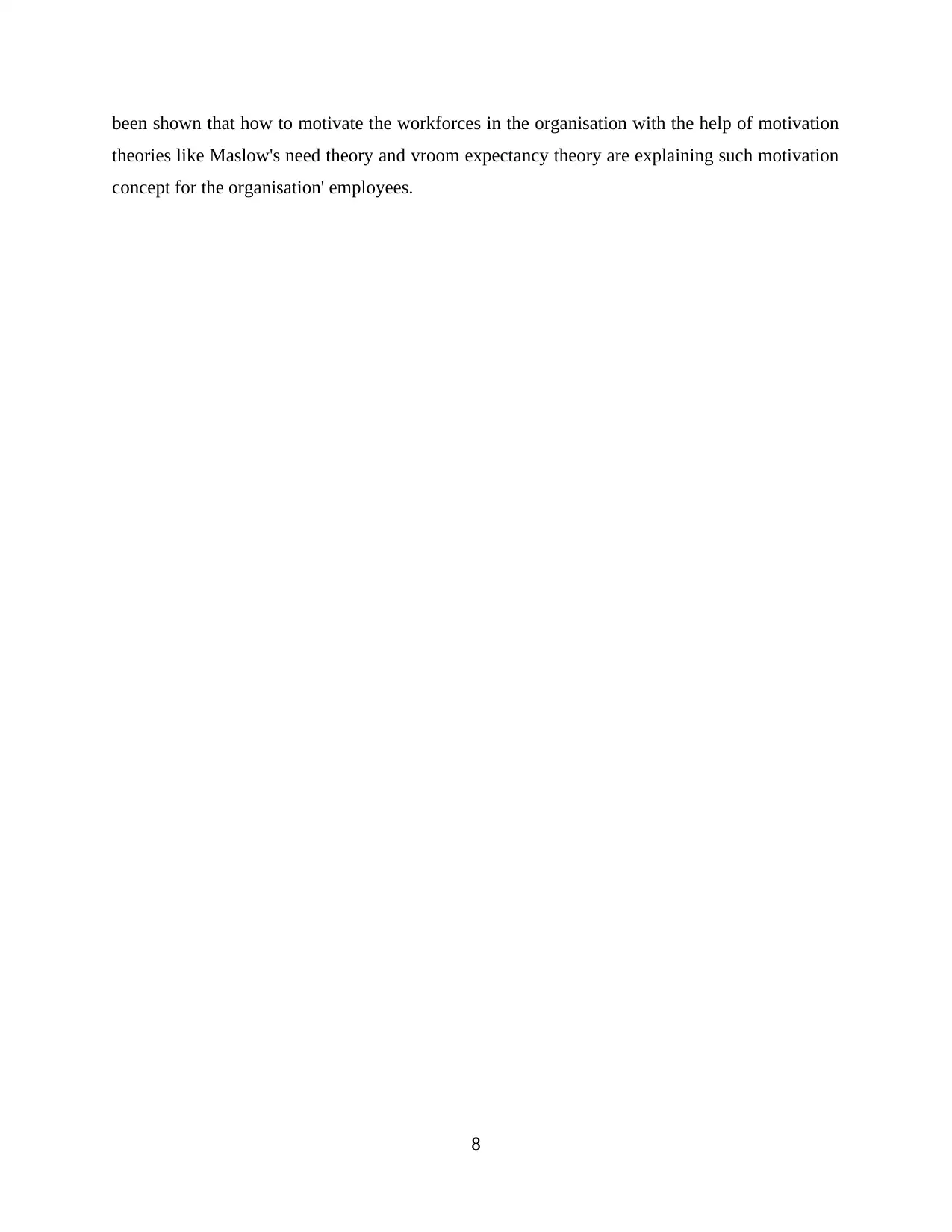
been shown that how to motivate the workforces in the organisation with the help of motivation
theories like Maslow's need theory and vroom expectancy theory are explaining such motivation
concept for the organisation' employees.
8
theories like Maslow's need theory and vroom expectancy theory are explaining such motivation
concept for the organisation' employees.
8
Paraphrase This Document
Need a fresh take? Get an instant paraphrase of this document with our AI Paraphraser
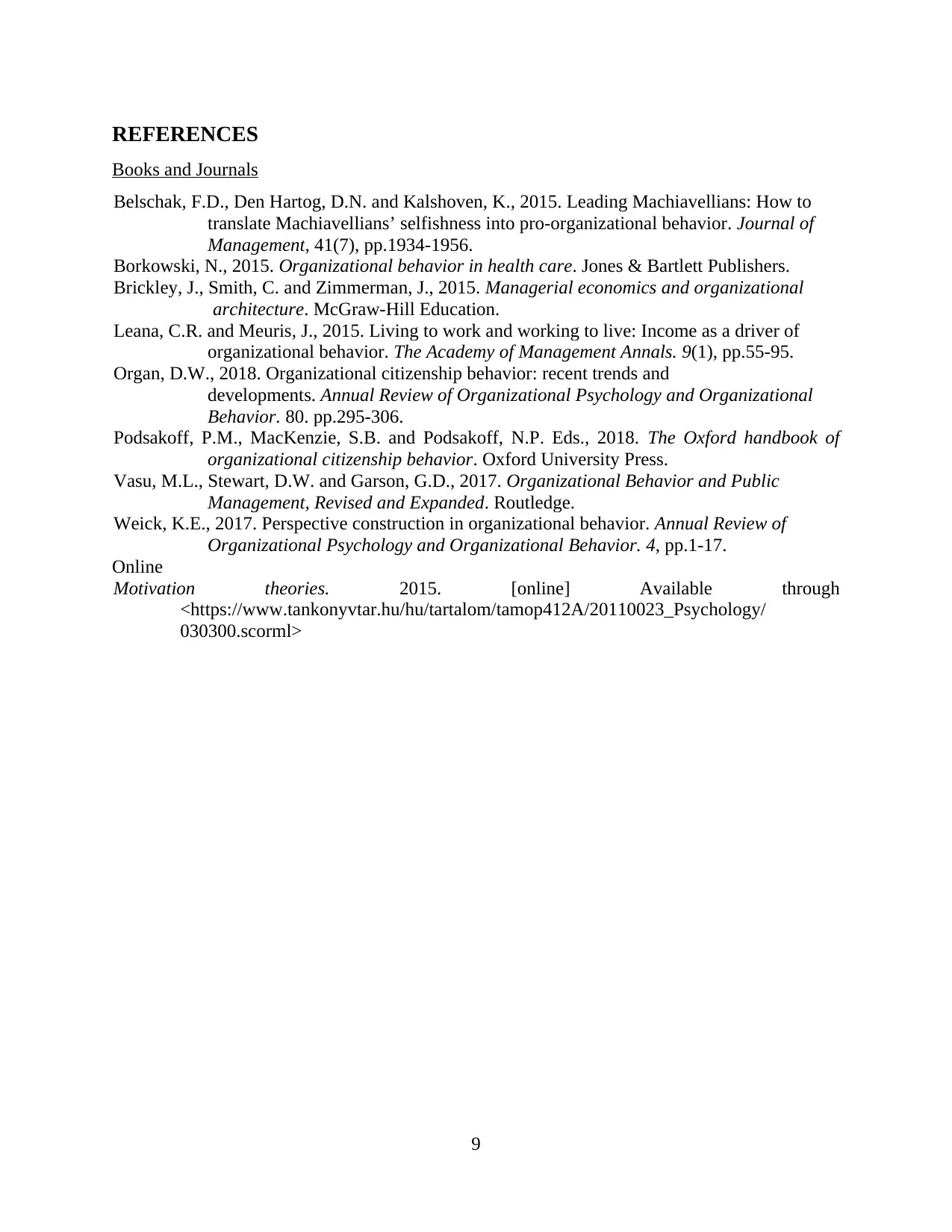
REFERENCES
Books and Journals
Belschak, F.D., Den Hartog, D.N. and Kalshoven, K., 2015. Leading Machiavellians: How to
translate Machiavellians’ selfishness into pro-organizational behavior. Journal of
Management, 41(7), pp.1934-1956.
Borkowski, N., 2015. Organizational behavior in health care. Jones & Bartlett Publishers.
Brickley, J., Smith, C. and Zimmerman, J., 2015. Managerial economics and organizational
architecture. McGraw-Hill Education.
Leana, C.R. and Meuris, J., 2015. Living to work and working to live: Income as a driver of
organizational behavior. The Academy of Management Annals. 9(1), pp.55-95.
Organ, D.W., 2018. Organizational citizenship behavior: recent trends and
developments. Annual Review of Organizational Psychology and Organizational
Behavior. 80. pp.295-306.
Podsakoff, P.M., MacKenzie, S.B. and Podsakoff, N.P. Eds., 2018. The Oxford handbook of
organizational citizenship behavior. Oxford University Press.
Vasu, M.L., Stewart, D.W. and Garson, G.D., 2017. Organizational Behavior and Public
Management, Revised and Expanded. Routledge.
Weick, K.E., 2017. Perspective construction in organizational behavior. Annual Review of
Organizational Psychology and Organizational Behavior. 4, pp.1-17.
Online
Motivation theories. 2015. [online] Available through
<https://www.tankonyvtar.hu/hu/tartalom/tamop412A/20110023_Psychology/
030300.scorml>
9
Books and Journals
Belschak, F.D., Den Hartog, D.N. and Kalshoven, K., 2015. Leading Machiavellians: How to
translate Machiavellians’ selfishness into pro-organizational behavior. Journal of
Management, 41(7), pp.1934-1956.
Borkowski, N., 2015. Organizational behavior in health care. Jones & Bartlett Publishers.
Brickley, J., Smith, C. and Zimmerman, J., 2015. Managerial economics and organizational
architecture. McGraw-Hill Education.
Leana, C.R. and Meuris, J., 2015. Living to work and working to live: Income as a driver of
organizational behavior. The Academy of Management Annals. 9(1), pp.55-95.
Organ, D.W., 2018. Organizational citizenship behavior: recent trends and
developments. Annual Review of Organizational Psychology and Organizational
Behavior. 80. pp.295-306.
Podsakoff, P.M., MacKenzie, S.B. and Podsakoff, N.P. Eds., 2018. The Oxford handbook of
organizational citizenship behavior. Oxford University Press.
Vasu, M.L., Stewart, D.W. and Garson, G.D., 2017. Organizational Behavior and Public
Management, Revised and Expanded. Routledge.
Weick, K.E., 2017. Perspective construction in organizational behavior. Annual Review of
Organizational Psychology and Organizational Behavior. 4, pp.1-17.
Online
Motivation theories. 2015. [online] Available through
<https://www.tankonyvtar.hu/hu/tartalom/tamop412A/20110023_Psychology/
030300.scorml>
9
1 out of 11
Related Documents
Your All-in-One AI-Powered Toolkit for Academic Success.
+13062052269
info@desklib.com
Available 24*7 on WhatsApp / Email
![[object Object]](/_next/static/media/star-bottom.7253800d.svg)
Unlock your academic potential
Copyright © 2020–2025 A2Z Services. All Rights Reserved. Developed and managed by ZUCOL.





